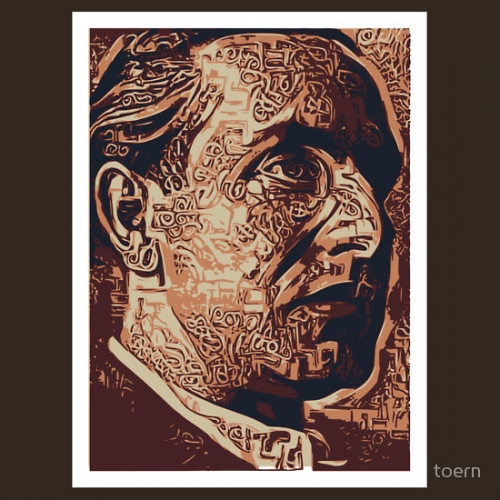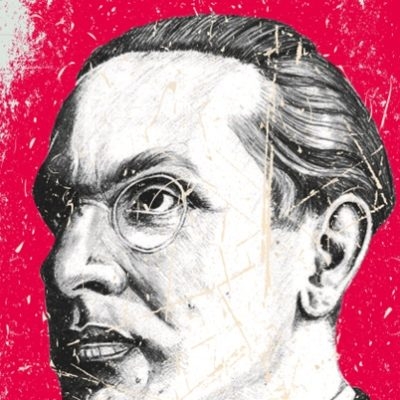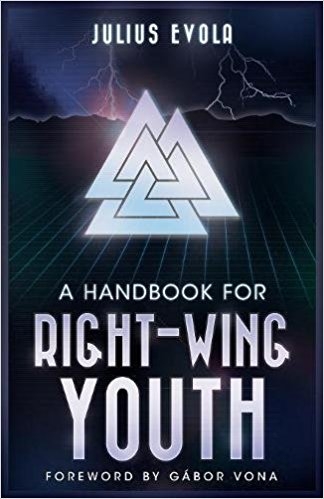jeudi, 09 novembre 2017
The Youth, Evola and the rise of a true Right

The Youth, Evola and the rise of a true Right
by Thierry Durolle
As traditionalists (1), we believe in the doctrine of cosmic cycles (2) and therefore we know that our present time matches with the last cycle, the one which is known by the name of Kali-Yuga (3). This particular cycle is the darkest one of all four cycles and affects every aspects of life in general. Thus human beings, civilizations and politics cannot escape its corrupting power. This is an important fact to keep in mind.
However, the cycle ends only to start up again with the first one, the Golden age or Krita-Yuga, the dark days leaves room for a new era. Yet in the meantime some of us, the youth, feels the urge for political action but need a strong formation to face the abominations of our post-modern societies. Right-wing is a wide concept after all, as it is the same for the Left. In France – we give this example because we know the situation of this country very well – the Right means ‘Economic Right’, even if it appears sometimes more progressive, sometimes more conservative. Within its scale of principals, the economic principle is always the highest and all the others are subordinated to it. Here is a clear example of a final stage of involution.
The definition of what should be considered the real Right is an imperative task. Among the numerous topics he dealt with through his writings, Julius Evola wrote numerous articles about that question. The Italian philosopher, often reduced to an ‘esoteric fascist’, embodies himself the man of the Right. His writings but especially his deeds made him a living example of the uprightness one would try to attain. The neo-fascist youth of post WW2 Italy was not wrong to seek all the gems herein Evola’s books in order to build its doctrine.
Originally published in Hungarian at the end of 2012 as an anthology of Evola’s articles about the youth and the Right, A Handbook For Right-Wing Youth is now available thanks to Arktos in English. We hope that a french version will see the day sooner or later. Indeed, Evola’s influence on the now famous french Nouvelle Droite and all its heirs (from identitarians to national-revolutionary and traditionalist-revolutionary militants), not to mention the founder of this website Georges Feltin-Tracol (4), contributors Daniel Cologne (5) and ourselves, is simply huge.
A Handbook For Right-Wing Youth contains seventeen texts, mostly press articles but also some excerpts from books like The Bow and the Club and the entire essay Orientations. It includes a foreword by Gabor Vona who is the Chairman of Jobbik and bibliographical notes by Robert Horvath. We also must stress the numerous footnotes and the quality of their explanations. The reader ends up with a handbook intended for militants but also for anyone yearning to discover Julius Evola.
As the title suggests, the two main subjects are the Right and the Youth. The first one was a common topic developed by the author along his writings. In fact the Right follows the Italian writer like his shadow. Julius Evola remains the most political awakener of the Tradition. He always considered himself a man of the Right, he wrote about the Right and his critics and stances outlined a doctrine, even better, a view of the world from the Right:
‘Yet it is also possible to leave all institutional assumptions aside and speak of the Right as a spiritual orientation and worldview. Aside from opposing democracy and all ‘socialists’ myths, belonging to the Right means upholding the values of Tradition as spiritual, aristocratic, and warrior values (possibly with references to a strict military tradition, as in the case of Prussianism, for instance). Moreover, it means harboring a certain contempt for intellectualism and for the bourgeois fetishism of the ‘cultured man’ [...]’ (p.50.).

Throughout the different texts herein the book, Julius Evola stresses how the real Right is: anti-egalitarian, anti-materialistic, anti-democratic but spiritual and heroic. In one word traditionalist: ‘In this sense, the concept of Tradition applies to a system in which ‘all activities are in principle ordered from above and have an upward direction’ (p.37.). In addition, Julius Evola aims at the main sources of infection which must be fought according to him (Marxism, Psychoanalysis, existentialism and Darwinism) and give some clues on the cultural domains that the Right should focus on, one of them being the historiography.
About the second subject Robert Harvath points out ‘that the subject of youth was not among Evola’s central concerns; it’s a thin, but visible, line that runs throughout his entire oeuvre’ (p.150.). When writing about the Youth, Julius Evola either encourages an autre jeunesse or, on the contrary, criticizes it. The latter belongs to the average youth so to speak and Evola focused especially his critics on students and beatniks like in Against the Youth or Some Observations on the Student Movement, both featuring in this handbook.
Julius Evola wrote his first post WW2 writings for the young Italian neo-fascist militants. He does not write about what has to be done but how to be:
‘Not letting oneself go is what is crucial today. In this society gone astray, one must be capable of the luxury of having a character. One ought to be such that, even before being recognized as the champion of a political idea, one will display a certain conduct of life, an inner coherence, and a style consisting of uprightness and intellectual courage in every human relationship’(p.1).
‘As spirit there exists something that can serve as an outline for the forces of resistance: it is the legionary spirit. It is the attitude of one who knows how to choose the hardest life, to fight even when he knows that the battle is substantially lost, and to confirm the words of the ancient saga: ‘loyalty is stronger than fire’. Through him the traditional idea is affirmed’(p.7).
‘Inner action must precede all other actions’(p.3).
We believe that these advice are of first-hand importance even if Evola wrote about more strictly political themes like the imperial idea, corporatism, occult war or the ‘demonic possession of the economy’. Some people like Claudio Mutti hastily made Evola an admirer of islam since he positively showed to his readers the warlike mentality of this particular religion and its concept of greater jihad. What he wanted to show (and mostly liked) is this ascetic process, this almost alchemical transformation of oneself to reach something higher. His interests for magic, which he explored in company of Arturo Reghini (6) in the Ur-group, his interest for vamachara tantra or mountaineering are facts that tend to prove our point.
Concerning this collection of texts, we could have appreciated if the last parts of Evola’s Ride the Tiger (6) which consist in a bunch of precepts to be and become in this dark age of Kali-Yuga could have been added. Also, and this would have been a necessary addition according to us, some texts or excerpts from his writings about race, which would have been an excellent correcting concerning racialism.
To conclude, A Handbook For Right-Wing Youth is definitely a must have for any political and metapolitical militants, for every men of the Right in its true essence. We strongly believe that Western societies need a renewal of the Right, not to say a revolution. Gabor Vona pointed out a real problem in nowadays ‘real right’:
‘The tragedy of this situation is that the tools of the Left are infectious. This creates a political catastrophe, which is extremely common nowadays: the landscape of the so-called Right is in reality becoming more and more filled with Leftist ideas, and allows the Left’s borders to approach closer and closer, displaying and mainstreaming the pseudo- or fake Rightism. Of course, this results in total confusion, schizophrenia, and a chaos of ideas’ (p.11. Of the foreword).

This is the greater danger the real Right faces now. National-Bolshevism and nazi-maoism left aside (even if their Third-Worldism was ideologically harmful), we clearly identify a strong ‘leftisation’ of the French Nouvelle Droite (especially of one of its prominent figure Alain de Benoist) and what the mass media names Far-Right. The prevalence of the social and economic question, the critics of liberalism from a marxist perspective and worse, the abandonment of the defense of our people’s race – the number one emergency for most of western European countries – and the will to even avoid such words and topics are true signs of degeneracy. We do not have the time and should not bother analyzing the causes; the fruit is too far rotten. The time to rebuild a true Right is now. Julius Evola’s books and A Handbook For Right-Wing Youth are more than necessary readings in order to set les idées à l’endroit!
Thierry Durolle
 Footnotes:
Footnotes:
(1) By ‘traditionalist’ we mean someone who refers to the meaning of the word explained by René Guénon.
(2) The doctrine of cosmic cycles is often understood as Hindu concept, yet it corresponds to Hesiod’s ages of Man as well.
(3) It is the same than Hesiod’s age of iron or Nordic age of the wolf.
(4) Born in 1970, Georges Feltin-Tracol is the editor-in-chief of the Europe Maxima website as well as the author of numerous books and articles. Being a long time militant for the Greater Europe, he always claimed Julius Evola’s influence on his work.
(5) Born in 1946, Daniel Cologne is a journalist and essayist. He wrote several books about Tradition and worked with the traditionalist magazine Totalité.
(6) Born in 1878, Arturo Reghini was an Italian free-mason and was considered as the most famous Italian Pythagorean.
(7) Julius Evola, Ride the Tiger: A Survival Manual for the Aristocrats of the Soul, Inner Traditions, 2003, 256 pages.
01:40 Publié dans Nouvelle Droite, Philosophie, Révolution conservatrice, Traditions | Lien permanent | Commentaires (1) | Tags : états-unis, altright, nouvelle droite, nouvelle droite américaine, american new right, philosophie, tradition, traditionalisme, julius evola |  |
|  del.icio.us |
del.icio.us |  |
|  Digg |
Digg | ![]() Facebook
Facebook



Commentaires
Traditionalists downplay science and progress and therefore miss developments that contradict the inevitability of cycles. I think it is foolish to put all your faith in cycles. People and nations fall for reasons that can be corrected. Cycles can be overcome.
The only cycle I affirm for sure is when a culture tries to deny real human nature, eg. with cultural Marxism, it always returns to real human nature, eg. to an ethnopluralism of ethnostates. This is why the beloved empires of traditionalists always fall, and also how the cycle can be avoided. Spiritualism has little to to do with it.
It's easy to dream of cycles when your reality is based in a spiritualism that does not exist. Godhood exist but is evolved to in the material and supermaterial world.
Écrit par : Kenneth Anderson | jeudi, 09 novembre 2017
Les commentaires sont fermés.